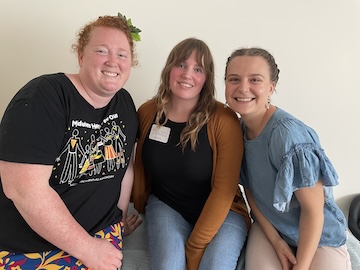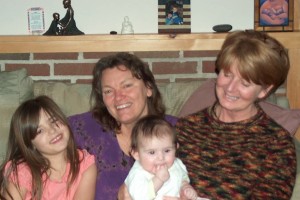
Full Circle Midwifery Service, Inc. was incorporated in Michigan in 1987. The Midwives and associates are not nurses, nurse midwives, nor physicians. We do not carry malpractice insurance, nor have privileges at any hospitals or clinics, and have limited access to labs and testing facilities. No formal agreements exist between licensed health care professionals with hospital admitting privileges and Full Circle Midwifery.
Patrice Bobier, CPM, Licensed Midwife, is the owner and senior Midwife at Full Circle. She is assisted with the practice and at births by midwifery students Melinda Bagaga, Brenna Kelley and Lauryn Anderson, who are all working toward licensure. Associate midwives Dorothy Vandezande, CPM, LM, Jennifer Holshoe, CPM, LM, and Laurie Zoyiopoulos, CPM, LM, provide back-up if Patrice is unable to attend. We occasionally have other students circulating through the practice.
All midwives, assistants and students are certified in Neonatal Resuscitation, and are members of the Michigan Midwives Association and the Midwives Alliance of North America. They practice according to licensing and administrative rules for licensed midwives in Michigan, as well as protocols and standards for home birth and midwifery care established by their credentialing organizations.
Childbirth is a normal event for most women. Midwifery care strives to keep birth safe and family-centered. It empowers women to keep healthy during pregnancy, to give birth naturally, and to parent in the best ways. Every woman has the right to choose where and with whom she has her baby. Upon deciding to work together, we will do our best to honor the sacredness of your birth, and to be respectful and accepting of your choices about your birth. We support shared decision-making ~ clients and midwives decide together on a care plan for the pregnancy, birth and postpartum.
The midwives monitor and assess the health of you and your baby during your pregnancy, labor, birth, and immediate postpartum. Permission is usually asked before providing care. They keep you informed of what they are doing and why, and what their evaluation is. Copies of your records are available to you any time. The midwives are available to talk to you at any time. They are open and honest with you: answering your questions, providing reassurance, helping to provide information to you so you can make informed decisions about your care. You are encouraged to obtain referrals from other clients of Full Circle Midwifery Service. See the Birth Story page for referrals now!
Melinda, Brenna and Lauryn!

Patrice and Barb with 2 darling home-born girls visiting the Full Circle office.
To see STATISTICS for Full Circle Midwifery ~ 1791 Planned Home Births ~ from 1984 through 2022, click HERE!
____________________________________________________________
This is an article written in my local newspaper and did a great job of capturing how I still feel about midwifery and birth:
Oceana Herald Journal – News Article 9/3/2003
999 babies… and counting
Midwife Patrice Bobier has delivered 999 babies, with the 1,000th newborn expected to arrive by next week. Bobier, who owns and operates Full Circle Midwifery Service, Inc., celebrated hitting the 1,000-mark Saturday during a reunion at the Ferry Township home of Patrice and her husband, Bill. Moms, dads and children delivered by Bobier attended the reunion and reminisced about the home births.
Bobier, 52, began training to become a midwife in 1979 and started her own practice in 1982. “I attended my first home birth in 1977 as a friend of the couple having the baby,” she said. “I wanted families to have a safe choice about their birth place and attendant. It is such a special time – pregnancy and the birth of a new baby – it should be a loving, empowering, enfolding experience that will bond the parents and baby for a lifetime of caring for each other.”
Donna Richert, a mother of four, had her two youngest children in her Spring Lake home under Bobier’s care. “It’s much more comfortable being at home,” Richert said. The stress of having to race off to the hospital to have the baby is completely eliminated when you’re under a midwife’s care, she said.
Erika Dertien, a mother of three young children, had her last child under Bobier’s care. “The major advantage (of home birth) is being relaxed in my own home,” Dertien said. She said it was nice that her husband, Jeff, was able to hold her during her son Jacob’s birth. “Whereas in the hospital, he could only hold my hand,” she said. Dertien said she gave birth to Jacob in the family’s hot tub with Jeff right at her side. “To have Jeff in there as well was very relaxing,” she said. “It was great – compared to the hospital setting, which was kind of tense and you don’t know what’s going to happen.” “More or less you put it in the doctor’s hands (during hospital births), but you know what to expect (during home births), and you’re more informed.” Dertien said she and Jeff are planning to have more children in the future. “We don’t know when, but yes, it would be a home birth,” she said.
Also at the reunion were the two other midwives involved in Bobier’s practice, Barb Olsen and Laurie Zoyiopoulos, and two apprentices, Jen Weese and Kirsten Grimm. “It’s fun to get together,” said Weese who is training under Bobier to become a midwife. “But this is extra special, because we timed it right around the time of her 1,000th birth.” Bobier has had a reunion just about every year to stay up to date with her clients and their families. In the past, she has had as many as 150 attendees. “Patrice is really knowledgeable,” said Olsen. “I really trust her.”
Bobier said there is no licensing for non-nurse midwives in Michigan, although an extensive amount of hands-on training is required. “I trained through apprenticeship, working with other midwives for three-and-a-half years, attending prenatal clinics and births, doing postpartum care for mothers and babies, following a course of self-study that we designed,” she said. “I am a CPM – Certified Professional Midwife. I also am certified by the Michigan Midwives Association, and have to follow state and national standards of practice. The certification requirements are extensive with written and oral exams, documentation of education and experience, written recommendations from clients and other professionals, etc.” “For both organizations, I have to re-certify every three years with required continuing education, certification in Neonatal Resuscitation and CPR, Peer Review. I have to provide statistics on every client I have contact with.”
Bobier has two children who are now 29 and 32 years old. “They were both hospital-born back when fathers were just being ‘allowed’ to be present. Many mothers were drugged to the point of being physically restrained, and contact between mother and baby was severely restricted,” she said. Bobier’s two grandchildren, Jenna, 4, and Tyler, 7, were home-born right into her hands. Another grandbaby is due in October.
The oldest baby whose birth Bobier attended is now 25 years old, and she has home-born children, ages 3 and 7. The youngest (number 999) was born last Thursday evening. She has delivered babies for mothers 16 to 47 years old.
Although births are not usually an emergency situation, Bobier said midwives are always prepared to handle one. Should an emergency occur, a midwife would “treat and transport (the patient) to the hospital and medical providers accordingly – in a similar way as smaller hospitals refer patients out to larger ones,” she explained.
Although she absolutely loves her profession, she does plan to eventually slow down the pace in the future. “I plan to gradually cut back as younger women are trained to take over this wonderful work,” she said.
“Midwifery care is much different than obstetric care – more teaching, sharing of responsibility and care with the mother and family, more hands-on, more intuitive, more common-sense and personal in its approach, less dependent on medical tests, drugs, interventions, less ‘assembly-line’ care,” she said. “We are available for the whole childbearing year to answer questions, provide reassurance,” Bobier said. “We monitor mom and baby for health, watch for complications, but in different ways than the medical way. We spend much more time with clients. I personally spend about 10 hours with each client before she goes into labor,” she explained. “When women are in labor, my associates and I are with them for as much of the time as they require – no change of shifts, no coming in at the last minute or leaving shortly after the birth. We make sure babies and moms get breastfeeding established, and the family is coping with the changes a new baby brings as we do home visits in the first week after the birth.”
The 1,000th baby Bobier will be delivering is tentatively slated to arrive in this world, Sept. 9, 2003.
